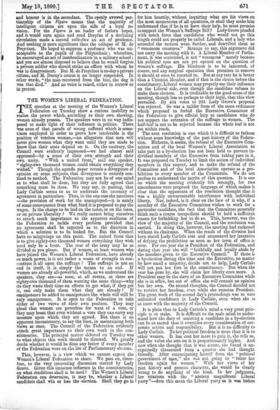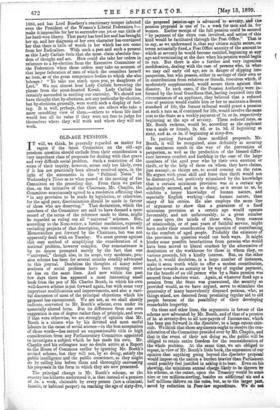TE E WOMEN'S LIBERAL FEDERATION. T El speeches at the meeting of
the Women's Liberal Federation on Tuesday show a curious inability to realise the power which, according to their own showing, women already possess. The speakers were in no way indis- posed to make light of their influence in politics. There was none of that parade of wrong suffered which is some- times employed in order to prove how intolerable is the position of voteless woman,—no allegation that men will never give women what they want until they are made to know that their seats depend on it. On the contrary, the Council were evidently impressed—we had almost said oppressed—by a sense of their own strength and their own unity. " With a united front," said one speaker, " eighty-two thousand women could obtain everything they wished." Though the agenda paper reveals a divergence of opinion on some subjects, that divergence is entirely con- fined to method. The Federation may not be of one mind as to what shall be done, but they are fully agreed that something must be done. We may say, in passing, that Lady Carlisle seems to us to underrate the necessity of agreement in particulars. Thus, in the one case she mentions —the provision of work for the unemployed—it is surely of some consequence from what fund it is proposed to pay the wages. Is the charge to be laid on the taxes, or on the rates, or on private liberality ? We really cannot bring ourselves to attach much importance to the apparent readiness of the Federation to tackle every problem provided that no agreement shall be expected as to the direction in which a solution is to be looked for. But the Council have no misgivings on this point. The united front that is to give eighty-two thousand women everything they wish need only be a front. The rear of the army may be as divided as you please. But if women, at least women who have joined the Women's Liberal Federation, have already so much power, is it not rather a waste of strength to con- centrate it all upon the suffrage ? The suffrage is not an end in itself, it is simply the means to an end. If women are already all-powerful, which, as we understand the speakers, they are—as soon, at all events, as there are eighty-two thousand of them wanting the same thing—why do they waste their time on efforts to get what, if they get it, can only make them what they are already ? If omnipotence be added to omnipotence the whole will still be only omnipotence. It is open to the Federation to take either of two views of their own position. They may plead that women are powerless for want of a vote, or they may boast that even without a vote they can carry any measure upon which they are agreed. But there is an apparent inconsistency, to say the least, in maintaining both views at once. The Council of the Federation evidently attach great importance to their own work in the con- stituencies. The principal matter debated on Tuesday was to what objects this work should be directed. We greatly doubt whether it would be done any better if every member of the Federation were on the list of Parliamentary electors.
This, however, is a view which we cannot expect the Women's Liberal Federation to share. We pass on, there- fore, to the very interesting discussion started by Lady Grove. Given this immense influence in the constituencies, on what denditions shall it be used? The Women's Liberal Federation can determine, it may be, whether a Liberal candidate shall win or lose the election. Shall_ they go in for him heartily, without inquiring what are his views on the most momentous of all questions, or shall they make him understand that if he is to have their help, he must promise to support the Woman's Suffrage Bill ? Lady Grove pleaded with much force that candidates who would not go this length could not properly be called Liberals, and a lady who seconded the motion went further, and described them as " venomous creatures." Strange to say, this argument did not carry the meeting with it. A Liberal Member of Parlia- ment, it was contended, is not " venomous " merely because his political eyes are not yet opened on the question of women's suffrage. His blindness is to be lamented, of course, and any surgical operation that promises to remove it should at once be resorted to. But at any rate he is better than a Unionist Member, and if that is the choice before the constituency, Liberal women may properly use their influence on the Liberal side, even though the candidate refuses to make them electors. It is creditable to the good sense of the meeting, though less so perhaps to their logic, that this view prevailed. By 404 votes to 221 Lady Grove's proposal was rejected. So was a milder form of the same ordinance whichproposed to forbid the Executive Committee of the Federation to give official help to candidates who do not support the extension of the suffrage to women. The half-loaf is not to be rejected because the whole loaf is not yet within reach. The next resolution is one which it is difficult to fathom without some knowledge of the past history of the Federa- tion. Hitherto, it seems, the refusal of the Executive Com- mittee and of the local Women's Liberal Association to take part in a by-election has not been held to prevent in- dividual members of the Executive from taking part in it. It was proposed on Tuesday to limit the action of individual members in this respect, and to make the refusal of the Committee and of the local Association operate as a pro- hibition to every member of the Committee. We do not profess to understand the merits of this question. It is one on which the meeting evidently felt strongly, for two amendments were proposed the language of which makes it clear that the opponents of the resolution thought that it was a highly unwarrantable interference with individual liberty. Nor, indeed, is it clear on the face of it why, if a member of the Executive Committee wishes to work for a particular candidate, the fact that the Committee generally think such a course inexpedient should be held a sufficient reason for forbidding her to do so. This, however, was the view of the majority of the Council, and the resolution was carried. In doing this, however, the meeting had reckoned without its chairman. When the result of the division had been stated Lady Carlisle rose and announced her intention of defying the prohibition as soon as her term of office is over. For one year she is President of the Federation, and during that year she will "faithfully and loyally abide by the mandate given to the Executive Council." If there is a by-election during this time and the Executive, no matter by how small a majority, decide net to help, Lady Carlisle will not put her foot in the constituency. But when the year has gone by, she will claim her liberty once more. A President may be the slave of an Executive Committee while she is in office, but out of office she will consult no opinion but her own. On second thoughts, the Council decided not to restrict her freedom, even while she remains President. The great work of the second day's proceedings was to vote unlimited confidence in Lady Carlisle, even when she is at issue with the majority of the Council.
It is plain that in Lady Carlisle's mind a very great prin- ciple is at stake. It is difficult to the male mind to under- stand how the duty of assisting a candidate in a by-election can be so sacred that it overrides every consideration of cor- porate action and responsibility. But it is no difficulty to Lady Carlisle. To her political freedom is more than it is to other women. It has cost her more to gain it, she tells us, and the value she sets on it is proportionately higher. And now when she thought that it was secure, she found it un- expectedly threatened from a quarter she had thought friendly. After emancipating herself from the "political government of man," she was not going to " fetter her freedom again for women." With her views of her past history and present character, she would be clearly wrong to do anything of the kind. In her judgment, her relations with the " ancient magnificent Liberal party "—does this mean the Liberal party as it was before 1886, and his Lord Rosebery's reactionary temper infected even the President of the Women's Liberal Federation ?- make it impossible for her to surrender one jot or one tittle of her hard-won liberty. That party has bred her and has brought her up, and her diagnosis of her own character has convinced her that there' s little of worth in her which has not come from her Radimlism With such a past and such a present as this Lady Carlisle feels that she must claim absolute free- dom.of thought and act. How could she take her orders in reference to a by-election from the Executive Committee of the Federation when those orders may take no account of that larger federation of men of which she considers herself an item, or of the great temperance bodies to which she also belongs ? " Ye take too much upon you, ye daughters of Levi." We can almost hear Lady Carlisle borrowing the phrase from the stout-hearted Borah. Lady Carlisle has certainly succeeded in exciting our curiosity. We should not have thought that by-elections, not any particular by-election, but by-elections generally, were worth such a display of feel- ing. It is well, perhaps, that there are others who take a more ennobling view of them,--others to whom life itself would lose all its value if they were not free to judge for themselves where they will work and where they will not work.







































 Previous page
Previous page